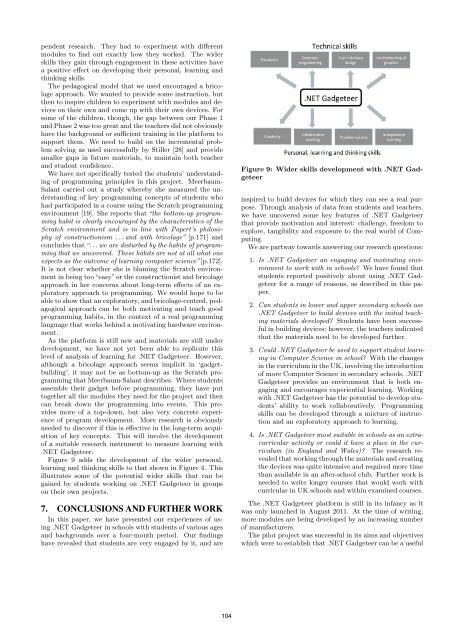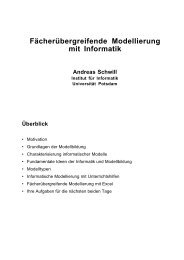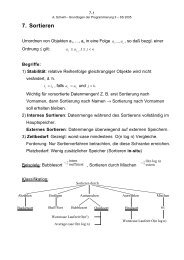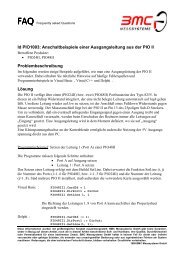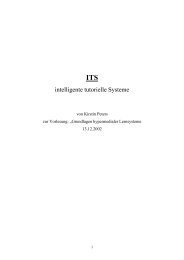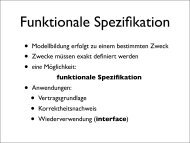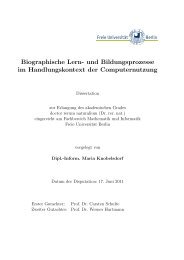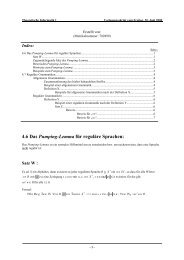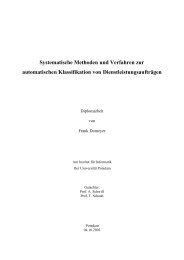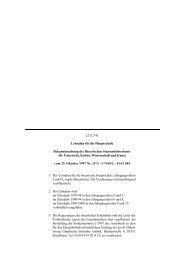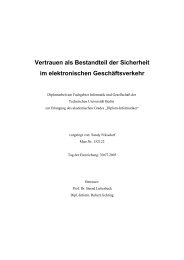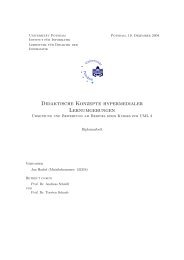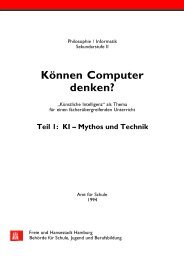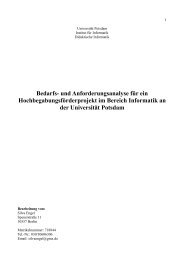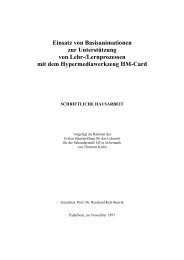Maria Knobelsdorf, University of Dortmund, Germany - Didaktik der ...
Maria Knobelsdorf, University of Dortmund, Germany - Didaktik der ...
Maria Knobelsdorf, University of Dortmund, Germany - Didaktik der ...
Create successful ePaper yourself
Turn your PDF publications into a flip-book with our unique Google optimized e-Paper software.
pendent research. They had to experiment with different<br />
modules to find out exactly how they worked. The wi<strong>der</strong><br />
skills they gain through engagement in these activities have<br />
a positive effect on developing their personal, learning and<br />
thinking skills.<br />
The pedagogical model that we used encouraged a bricolage<br />
approach. We wanted to provide some instruction, but<br />
then to inspire children to experiment with modules and devices<br />
on their own and come up with their own devices. For<br />
some <strong>of</strong> the children, though, the gap between our Phase 1<br />
and Phase 2 was too great and the teachers did not obviously<br />
have the background or sufficient training in the platform to<br />
support them. We need to build on the incremental problem<br />
solving as used successfully by Stiller [28] and provide<br />
smaller gaps in future materials, to maintain both teacher<br />
and student confidence.<br />
We have not specifically tested the students’ un<strong>der</strong>standing<br />
<strong>of</strong> programming principles in this project. Meerbaum-<br />
Salant carried out a study whereby she measured the un<strong>der</strong>standing<br />
<strong>of</strong> key programming concepts <strong>of</strong> students who<br />
had participated in a course using the Scratch programming<br />
environment [19]. She reports that “the bottom-up programming<br />
habit is clearly encouraged by the characteristics <strong>of</strong> the<br />
Scratch environment and is in line with Papert’s philosophy<br />
<strong>of</strong> constructionism . . . and with bricolage” [p.171] and<br />
concludes that “. . . we are disturbed by the habits <strong>of</strong> programming<br />
that we uncovered. These habits are not at all what one<br />
expects as the outcome <strong>of</strong> learning computer science” [p.172].<br />
It is not clear whether she is blaming the Scratch environment<br />
in being too “easy” or the constructionist and bricolage<br />
approach in her concerns about long-term effects <strong>of</strong> an exploratory<br />
approach to programming. We would hope to be<br />
able to show that an exploratory, and bricolage-centred, pedagogical<br />
approach can be both motivating and teach good<br />
programming habits, in the context <strong>of</strong> a real programming<br />
language that works behind a motivating hardware environment.<br />
As the platform is still new and materials are still un<strong>der</strong><br />
development, we have not yet been able to replicate this<br />
level <strong>of</strong> analysis <strong>of</strong> learning for .NET Gadgeteer. However,<br />
although a bricolage approach seems implicit in ‘gadgetbuilding’,<br />
it may not be as bottom-up as the Scratch programming<br />
that Meerbaum-Salant describes. Where students<br />
assemble their gadget before programming, they have put<br />
together all the modules they need for the project and then<br />
can break down the programming into events. This provides<br />
more <strong>of</strong> a top-down, but also very concrete experience<br />
<strong>of</strong> program development. More research is obviously<br />
needed to discover if this is effective in the long-term acquisition<br />
<strong>of</strong> key concepts. This will involve the development<br />
<strong>of</strong> a suitable research instrument to measure learning with<br />
.NET Gadgeteer.<br />
Figure 9 adds the development <strong>of</strong> the wi<strong>der</strong> personal,<br />
learning and thinking skills to that shown in Figure 4. This<br />
illustrates some <strong>of</strong> the potential wi<strong>der</strong> skills that can be<br />
gained by students working on .NET Gadgeteer in groups<br />
on their own projects.<br />
7. CONCLUSIONS AND FURTHER WORK<br />
In this paper, we have presented our experiences <strong>of</strong> using<br />
.NET Gadgeteer in schools with students <strong>of</strong> various ages<br />
and backgrounds over a four-month period. Our findings<br />
have revealed that students are very engaged by it, and are<br />
104<br />
Figure 9: Wi<strong>der</strong> skills development with .NET Gadgeteer<br />
inspired to build devices for which they can see a real purpose.<br />
Through analysis <strong>of</strong> data from students and teachers,<br />
we have uncovered some key features <strong>of</strong> .NET Gadgeteer<br />
that provide motivation and interest: challenge, freedom to<br />
explore, tangibility and exposure to the real world <strong>of</strong> Computing.<br />
We are partway towards answering our research questions:<br />
1. Is .NET Gadgeteer an engaging and motivating environment<br />
to work with in schools? We have found that<br />
students reported positively about using .NET Gadgeteer<br />
for a range <strong>of</strong> reasons, as described in this paper.<br />
2. Can students in lower and upper secondary schools use<br />
.NET Gadgeteer to build devices with the initial teaching<br />
materials developed? Students have been successful<br />
in building devices; however, the teachers indicated<br />
that the materials need to be developed further.<br />
3. Could .NET Gadgeteer be used to support student learning<br />
in Computer Science in school? With the changes<br />
in the curriculum in the UK, involving the introduction<br />
<strong>of</strong> more Computer Science in secondary schools, .NET<br />
Gadgeteer provides an environment that is both engaging<br />
and encourages experiential learning. Working<br />
with .NET Gadgeteer has the potential to develop students’<br />
ability to work collaboratively. Programming<br />
skills can be developed through a mixture <strong>of</strong> instruction<br />
and an exploratory approach to learning.<br />
4. Is .NET Gadgeteer most suitable in schools as an extracurricular<br />
activity or could it have a place in the curriculum<br />
(in England and Wales)? The research revealed<br />
that working through the materials and creating<br />
the devices was quite intensive and required more time<br />
than available in an after-school club. Further work is<br />
needed to write longer courses that would work with<br />
curricular in UK schools and within examined courses.<br />
The .NET Gadgeteer platform is still in its infancy as it<br />
was only launched in August 2011. At the time <strong>of</strong> writing,<br />
more modules are being developed by an increasing number<br />
<strong>of</strong> manufacturers.<br />
The pilot project was successful in its aims and objectives<br />
which were to establish that .NET Gadgeteer can be a useful


